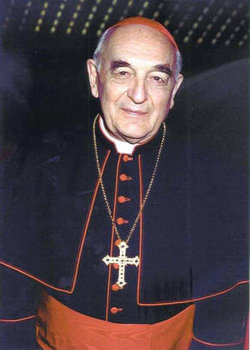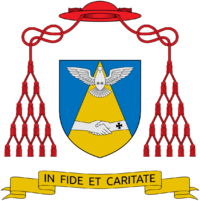Roberto Tucci facts for kids
Quick facts for kids Roberto Tucci |
|
|---|---|
| Cardinal-Priest of Sant'Ignazio di Loyola a Campo Marzio | |
 |
|
| Predecessor | Paolo Dezza |
| Successor | Luis Ladaria Ferrer |
| Orders | |
| Ordination | 24 August 1950 |
| Created Cardinal | 21 February 2001 |
| Rank |
|
| Personal details | |
| Birth name | Roberto Tucci |
| Born | 19 April 1921 Naples, Italy |
| Died | 14 April 2015 (aged 93) Rome, Italy |
| Nationality | Italian |
| Denomination | Roman Catholic |
| Motto | In fide et caritate |
| Coat of arms |  |
| Styles of Roberto Tucci |
|
|---|---|
 |
|
| Reference style | His Eminence |
| Spoken style | Your Eminence |
| Informal style | Cardinal |
Roberto Tucci (19 April 1921 – 14 April 2015) was an Italian Catholic priest. He was a theologian (someone who studies religion) and a journalist. He was also a member of the Jesuits, a religious group of priests and brothers.
Roberto Tucci played a big part in the Second Vatican Council, an important meeting of the Catholic Church. He also helped manage communications for the Holy See (the Pope's main office). He was famous for organizing the many trips taken by Pope John Paul II around the world. In 2001, he was made a Cardinal, which is a very high rank in the Catholic Church. Even as a Cardinal, he preferred to be called "Padre Tucci," which means "Father Tucci."
Contents
Roberto Tucci's Life Story
Roberto Tucci was born in Naples, Italy, on 19 April 1921. His father was Italian, and his mother was English. He was first baptized in the Anglican Church. Later, at age 13, he was baptized again in the Catholic Church.
When he was 15, he joined the Jesuits. He studied theology at universities in Belgium and Rome. He became a priest on 24 August 1950. For two years, he taught at a seminary in Naples. He also started a religious journal.
Working at the Second Vatican Council
Roberto Tucci was a key person at the Second Vatican Council. This was a very important meeting of Catholic leaders from 1962 to 1965. He was a peritus, which means a theological expert. He helped write two important documents from the Council. These documents helped guide the Church into modern times.
During the Council, he gave daily press briefings to journalists. He also became good friends with Cardinal Karol Wojtyła, who later became Pope John Paul II. After the Council, he worked to share its ideas. He was especially interested in ecumenism, which means working for unity among different Christian churches. He was the first Catholic priest to speak at a meeting of the World Council of Churches in 1968.
His Work in Communications
From 1959 to 1973, Roberto Tucci was the editor of La Civiltà Cattolica, an important Jesuit magazine. He made the magazine more modern and international.
He also became the director general of Vatican Radio from 1973 to 1985. Vatican Radio broadcasts news and religious programs around the world. He was in charge of press relations when Pope John Paul II released an important letter called Redemptor Hominis in 1979.
Organizing Papal Trips
One of Roberto Tucci's most important jobs was organizing Pope John Paul II's trips outside Italy. From 1982 to 2001, he helped plan and went on 77 of the Pope's 79 international journeys. This meant a lot of travel and careful planning!
People who worked with him said he was a friendly person. He was known for his down-to-earth way of talking. He was a favorite among journalists because he was open and honest.
Becoming a Cardinal
On 21 February 2001, Pope John Paul II made Roberto Tucci a Cardinal. He was given the title of Cardinal-Deacon of Sant'Ignazio di Loyola a Campo Marzio. The Pope gave him special permission not to be ordained a bishop, which is usually required for cardinals. For a short time, he was able to vote for a new Pope, even though he was not a bishop.
In 2011, he chose to become a Cardinal-Priest.
Later Life and Death
Roberto Tucci's health began to decline in 2013. He passed away in a clinic in Rome on 14 April 2015, at the age of 93. He was buried in the Jesuit chapel in Rome's Campo Verano Cemetery.
He received several awards during his life. The French government gave him the Légion d'honneur in 1976. He also received an honorary law degree from the University of Notre Dame in 1966.
 | Claudette Colvin |
 | Myrlie Evers-Williams |
 | Alberta Odell Jones |

